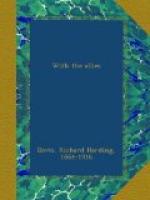No one wished to carry our despatches, as he feared they might contain something unfavorable to the Germans, which, if he were arrested and the cables read, might bring him into greater trouble. Money for himself was no inducement. But I found if I gave money for the Red Cross no one would refuse it, or to carry the messages.
Three out of four times the stranger would be arrested and ordered back to Brussels, and our despatches, with their news value departed, would be returned.
An account of the Germans entering Brussels I sent by an English boy named Dalton, who, after being turned back three times, got through by night, and when he arrived in England his adventures were published in all the London papers. They were so thrilling that they made my story, for which he had taken the trip, extremely tame reading.
Hugh Gibson, secretary of the American legation, was the first person in an official position to visit Antwerp after the Belgian Government moved to that city, and, even with his passes and flag flying from his automobile, he reached Antwerp and returned to Brussels only after many delays and adventures. Not knowing the Belgians were advancing from the north, Gibson and his American flag were several times under fire, and on the days he chose for his excursion his route led him past burning towns and dead and wounded and between the lines of both forces actively engaged.
He was carrying despatches from Brand Whitlock to Secretary Bryan. During the night he rested at Antwerp the first Zeppelin air-ship to visit that city passed over it, dropping one bomb at the end of the block in which Gibson was sleeping. He was awakened by the explosion and heard all of those that followed.
The next morning he was requested to accompany a committee appointed by the Belgian Government to report upon the outrage, and he visited a house that had been wrecked, and saw what was left of the bodies of those killed. People who were in the streets when the air-ship passed said it moved without any sound, as though the motor had been shut off and it was being propelled by momentum.
One bomb fell so near the palace where the Belgian Queen was sleeping as to destroy the glass in the windows and scar the walls. The bombs were large, containing smaller bombs of the size of shrapnel. Like shrapnel, on impact they scattered bullets over a radius of forty yards. One man, who from a window in the eighth story of a hotel watched the air-ship pass, stated that before each bomb fell he saw electric torches signal from the roofs, as though giving directions as to where the bombs should strike.
After my arrest by the Germans, I found my usefulness in Brussels as a correspondent was gone, and I returned to London, and from there rejoined the Allies in Paris.
I left Brussels on August 27th with Gerald Morgan and Will Irwin, of Collier’s, on a train carrying English prisoners and German wounded. In times of peace the trip to the German border lasts three hours, but in making it we were twenty-six hours, and by order of the authorities we were forbidden to leave the train.




